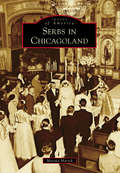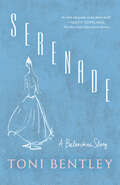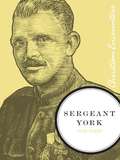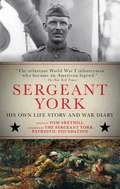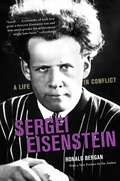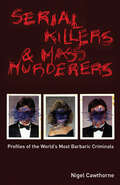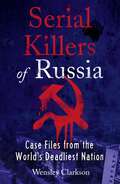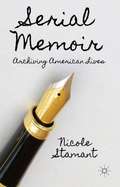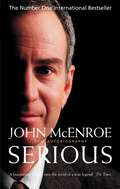- Table View
- List View
Ser yo, Tomi
by Tomás BenítezEl bailarín de freestyle Tomás Benítez les cuenta todos sus secretos a sus miles de seguidores. ¡Ey! ¡Hola! Bienvenid@ a mi libro. Quiero contarte mi historia, cómo fue que encontré lo que me apasiona. Sí, ya sabés. Bailar es lo que más me gusta en la vida. Cuando muevo mi cuerpo me siento libre. ¿Se nota? Quiero compartir con vos momentos muy fuertes que viví, experiencias que me marcaron (de las lindas y de las otras) y todo eso que me llevó a descubrir el freestyle. No creas que el camino es fácil. Y todavía tengo mucho por aprender. Pero si hay algo que tengo muy claro es que lo más importante es ser fiel a uno mismo. ¿Qué te dice tu corazón? ¿Quién sos? Yo soy Tomi.
Serbs in Chicagoland
by Marina MarichChicagoland boasts the world's largest population of Serbs outside of Serbia. Seeking economic opportunities and religious freedom, Serbs first settled in the area more than 100 years ago. Many found work in steel mills and other industries along the banks of Lake Michigan. The first Serbian Orthodox church in the Chicago area began serving parishioners in 1911, and more than a dozen additional congregations were built for the growing numbers of Serbs who arrived after World War II. Civic organizations, such as the Circle of Serbian Sisters, were established to honor and uphold customs from the "old country." Traditional Kolo dancing groups, tambura ensembles, and performance troupes have entertained Serbs and non-Serbs alike. Actor Karl Malden, perhaps the most famous Serbian American from the Chicagoland area, first took the stage in theater productions at his family's Gary, Indiana, Serbian Orthodox church. After the devastating wars in the Balkans in the 1990s, a new wave of Serbian immigrants arrived in Chicago, demonstrating that the city remains a welcoming place due to its abundance of Serbian culture, churches, and community.
Serena Williams (Amazing Athletes Ser.)
by Jon M FishmanTennis superstar Serena Williams won the Wimbledon singles title in 2015. It was her fourth Grand Slam tournament victory in a row, a feat she had also reached earlier in her career. Fans called it the Serena Slam. She had begun her tennis career in the shadow of her older sister Venus. But after completing the Serena Slam for the second time, Serena no longer stood in anyone's shadow. Learn all about one of the greatest tennis players of all time.
Serena Williams: Legends in Sports
by Matt ChristopherDiscover the amazing achievements of sports legend Serena Williams--on and off the tennis court--in this exciting new biography.Serena Williams has been ranked number one in the world for tennis singles, won twenty-two Grand Slam singles titles, and won four Olympic gold medals. She is a powerful player and a fierce competitor. Learn more about the record-breaking athlete in this comprehensive and action-packed biography, complete with stats and photographs.
Serenade: A Balanchine Story
by Toni BentleyToni Bentley, a dancer for George Balanchine, the greatest ballet maker of the 20th century, tells the story of Serenade, his iconic masterpiece, and what it was like to dance—and live—in his world at New York City Ballet during its legendary era. "Reading Bentley's Serenade made me feel as alive as I felt on the stage the moment that I fell in love with ballet…. [A] delicate balance of personal memoir, rarefied elegance, history of the arts and pure human interest.&”—Misty Copeland, New York Times Book Review "[A] unique document about one of the greatest ballets ever created…. A beautiful read&”—Mikhail BaryshnikovAt age seventeen, Toni Bentley was chosen by Balanchine, then in his final years, to join the New York City Ballet. From both backstage and onstage, she carries us through the serendipitous history and physical intricacies and demands of Serenade: its dazzling opening, with seventeen women in a double-diamond pattern; its radical, even jazzy, use of the highly refined language that is ballet; its place in the choreographer&’s own dramatic story of his immigration to the United States from Soviet Russia; its mystical—and literal—embodiment of the tradition of classical ballet in just thirty-three minutes. Bentley takes us inside the rarefied, intense, and thrilling world Balanchine created through his lifelong devotion to celebrating and expanding female beauty and strength—a world that, inevitably, passed upon his death. An intimate elegy to grace and loss and to the imprint of a towering artist and his transcendent creation on Bentley&’s own life, Serenade: A Balanchine Story is a rich narrative by a dynamic artist about the nature of art itself at its most ephemeral and glorious.
Serenissima: A Novel of Venice
by Erica JongSerenissima is the story of a love so great it bends time out of shape. A novel of Venice today and Venice in its illustrious past, this exquisite tale gives the reader both a compelling portrait of our modern-day film world and a clue to the passions behind Shakespeare's most enigmatic work. Jessica Pruitt is a popular Hollywood actress in her forties who has come to Venice to be a judge in the Venice Film Festival. In the rollicking paparazzi-crazed atmosphere of the festival Jessica senses that something mysterious is in the air. She begins receiving roses and sonnets from an unknown admirer who seems to be beckoning her to leave the narcissistic present and enter an enchanted past. The weather grows colder, the tourists depart, the canals freeze; it is one of the coldest autumns in history. Jessica is captive in Venice and goes deeper and deeper into Shakespeare and the history of the city, which the Venetians call "La Serenissima." While exploring the Jewish ghetto of Venice, Jessica suddenly finds herself at the Grand Canal in the Venice of Shakespeare's time-where she has, at once, been transformed into a Venetian Jewess of the sixteenth century. Shakespeare and his patron, the Earl of Southampton, have come to Venice to escape the plague, which rages in England, and a passionate love triangle develops among the three. Jessica experiences the great sensual love she has always been seeking, a love that history decrees cannot last, except in the timeless world of poetry.
Sergeant Rex: The Unbreakable Bond Between a Marine and His Military Working Dog
by Mike DowlingThe thrilling and inspiring story of a US Marine and his dog Rex, a bomb sniffing German Shepard, who forged a bond of trust and loyalty while serving on the war-torn streets of Iraq&’s most dangerous city.In Iraq we put our lives in each other&’s hands (and paws) day after day. We took care of each other no matter what. Rex and I have a bond that will last for the rest of our born days. If ever there was a marine who lived up to Semper Fidelis, the motto of the Marine Corps, it&’s Rex.Deployed to Iraq&’s infamous Triangle of Death in 2004, Sergeant Mike Dowling and his military working dog Rex were part of the first Marine Corps military K9 teams sent to the front lines of combat since Vietnam. It was Rex&’s job to sniff out weapons caches, suicide bombers, and IEDs, the devastating explosives that wreaked havoc on troops and civilians alike. It was Mike&’s job to lead Rex into the heart of danger time and time again, always trusting Rex to bring them both back alive. Dowling had turned twenty-five and Rex three just after they arrived in Iraq. Neither of them had any idea what to expect, and no training could fully prepare them for this job. An animal lover since childhood, Dowling had fostered and trained dogs for Guide Dogs for the Blind, and he was determined to serve in the military&’s K9 unit after joining the Marines. On their first patrols in Iraq, Rex suffered a seemingly incurable fear of explosions and gunfire, but with Mike at the other end of his leash, Rex gained the courage to perform his duty. Filled with harrowing tales of knife-edge bomb-detection work, including an extraordinary baptism by fire, Sergeant Rex is a heart-pounding account of how an unbreakable human-canine bond helped Mike and Rex to stay focused on their mission and save countless lives. Dowling takes us into the searing 130-degree heat, the choking dust, and the ever-present threat of violent attack that seemed to permeate Iraq&’s streets. We experience Dowling&’s visceral fear of walking down an IED-laden alley where dismemberment or death can come with any footstep, only his trusted partner, Rex, by his side. Loyalty is one of the hallmarks of any good Marine, and nowhere is that quality more evident than in this astonishing account of Mike Dowling and Rex&’s wartime experiences. A moving story of how a man and a dog developed complete trust in each other in the face of terrible adversity, Sergeant Rex is an unforgettable tale of sacrifice, courage, and love.
Sergeant York
by John PerryGrowing up in the Tennessee hills, Alvin York was equallyrenowned as a marksman and as a hard-drinking brawler. A dramatic New Year's conversionconvinced him that killing was against God's will, and yet this shy, big-bonedmountaineer singlehandedly dispatched two dozen Germans and captured 132 in theclosing days of World War I. He earned the Medal of Honor and a ticker tapeparade but refused to cash in on his fame, insisting "Uncle Sam's uniform ain'tfor sale."This succinct and gripping new account of Sgt. York's remarkablelife includes details from exclusive interviews with the sergeant's threesurviving children and information drawn from battlefield eyewitness reports andoriginal film studio archives: fresh reminders of the legacy of one of America'sgreat Christian patriots.We learn about life through the lives of others. Their experiences,their trials, their adventures become our schools, our chapels, our playgrounds.Christian Encounters, a series of biographies from Thomas Nelson Publishers,highlights important lives from all ages and areas of the Church through proseas accessible and concise as it is personal and engaging. Some are familiar faces.Others are unexpected guests. Whether the person is D.L. Moody, Sergeant York, SaintNicholas, John Bunyan, or William F. Buckley, we are now living in the worldthat they created and understand both it and ourselves better in the light oftheir lives. Their relationships, struggles, prayers, and desires uniquelyilluminate our shared experience.
Sergeant York: An American Hero
by David D. LeeA stirring account of the heroic World War I exploits and life of Tennessean Alvin C. York. &“Reads like a good novel.&” —Southern Living In a brief encounter on October 8, 1918, during the Argonne offensive, Alvin C. York killed 25 German soldiers and, almost singlehandedly, effected the capture of 132 others. Returning to the United States the following spring, he received a tumultuous public welcome and a flood of offers from businessmen eager to capitalize on his acclaimed feat. But York, true to his character, went quietly back to his home in the Tennessee mountains, where he spent the remainder of his life working to bring schools and other services to those remote valleys where his neighbors lived. In this definitive biography, David D. Lee goes beyond that single wartime episode, however, to consider its consequences on York&’s later life—his efforts, not always successful, to better his mountain community; his involvement in making a motion picture of his life; his difficulties with money and taxes. But Sergeant York is better known as a symbol than as an individual, and in this study Lee connects the man and his life to an American heroic ideal. With his rural background, his refusal to take commercial advantage of his fame, and his simple piety, Alvin York exemplified the traditional values of an agrarian America that was in his own day already receding into the past. He claimed a special place in the hearts of his countrymen, Lee concludes, because his life seemed to show that the virtues of the common man continued to be a vital part of American society.
Sergeant York: His Own Life Story and War Diary
by Alvin YorkOctober 8th, 1918—amid the last of the Allies attempts to the Germans, Sergeant Alvin York of Tennessee, found himself and his platoon of only seventeen men trapped in the thick of heavy machine gun fire. Rather than retreating or calling upon the artillery to take out the nest, York single-handedly took out twenty-five Germans, dropping them one-by-one, and captured many more. This is only one of the many tales of York’s famed heroism, which were heralded as some of the most impressive battle stories in history of modern warfare. Sergeant York contains the legendary soldier’s war diaries, which offer up-close snapshots of his fabled military career. Included in this new edition of a classic work are new forewords written by York’s son and grandson, which provide both personal and historical recollections of their predecessor. In Sergeant York, experience the fascinating life of an American hero.
Sergei Eisenstein: A Life in Conflict
by Ronald BerganNow back in print, this acclaimed biography reassesses a titan of early cinema based on new material released after the fall of the Soviet Union. Sergei Eisenstein: A Life in Conflict tells the dramatic story of one of world cinema’s towering geniuses and principal theorists. Ronald Bergan details Eisenstein’s life from his precocious childhood to his explosion onto the avant-garde scene in revolutionary Russia, through his groundbreaking film career, his relationships with authors and artists such as James Joyce and Walt Disney, and his untimely death at age fifty. Eisenstein’s landmark films, including The Battleship Potemkin and Ivan the Terrible, are still watched, admired, and taught throughout the world. Drawing upon material recently released from the Soviet archives after the breakup of the USSR and from Eisenstein’s personal letters, diaries, and sketches, Bergan shines a new light on the influence of Eisenstein’s early life on his work, his homosexuality, and his keen interest in the West. This book is the definitive biography of an influential director who saw film as the synthesis of all the arts and whose work displayed a passionate and profound grasp of art, science, philosophy, and religion.
Sergio: One Man's Fight to Save the World
by Samantha PowerThe inspiring profile of one man's courage and compassion-now a feature documentary from HBO(tm) films In this perfect match of author and subject, Pulitzer Prize-winner Samantha Power tackles the life of Sergio Vieira de Mello, whose work for the U. N. before his 2003 death in Iraq was emblematic of moral struggle on the global stage. Power has drawn on a staggering breadth of research (including 400 interviews) to show us a heroic figure and the conflicts he took on, from Cambodia's Khmer Rouge to the slaughter in Bosnia to the war-torn Middle East. The result is a peerless portrait of humanity and pragmatism, as well as a history of our convulsive age.
Serial Killers & Mass Murderers: Profiles of the World's Most Barbaric Criminals
by Nigel CawthorneShocking true stories of the world’s most notorious criminals from the author of Prince Andrew: Epstein, Maxwell and the Palace.Serial Killers & Mass Murderers takes you into the minds of the criminals who committed the world’s most notorious and horrifying crimes. Each of the sadistic murderers profiled here was once known simply as someone’s neighbor, co-worker or child. What turned them into killers? In one chilling chapter after another, this book profiles a terrifying succession of homicidal maniacs and asks the question, “What makes them tick?”Through the pages of this haunting book, you’ll delve into the psyches of . . . Jeffrey DahmerThe Zodiac KillerDr. Harold ShipmanSon of SamThe Columbine KillersCharles MansonThe Night StalkerThe Yorkshire RipperTed BundyCharles StarkweatherThe Boston StranglerAnd more“The refrigerator contained meat, including a human heart, in plastic bags. There were three human heads in the freezer. Two more skulls were found in a pot on the stove. Another pot contained male genital organs and severed heads, and there were the remains of three male torsos in the trash.”
Serial Killers of Mexico: Chilling Stories of Evil Buried Beneath the Narco Drug Wars
by Wensley ClarksonA collection of chilling stories of murders from Mexico, one of the world's most prolific hunting grounds for serial killers. 'If I was a serial killer looking for new victims, I'd head over the border to Mexico because life is cheap there and the police have got so much other sh*t to investigate, they don't bother with random killings.' - A former FBI agentFor decades, America has been considered to be the natural home of serial killers. Infamous names like Ted Bundy or Jeffrey Dahmer are internationally known and feared, and rightly so. But what if, just south of the border, there was a far more active network of serial killers? What if the perfect storm of crime, fuelled by this nation's deadly narco wars, has turned Mexico into an ideal hunting ground for many of the most bizarre and blood thirsty serial killers the world has ever seen?Serial Killers of Mexico delves into this criminal underbelly to tell the stories of the psychopathic loners, professional narco assassins and the overwhelmed law enforcement trying desperately to hunt them down.
Serial Killers of Mexico: Chilling Stories of Evil Buried Beneath the Narco Drug Wars
by Wensley ClarksonA collection of chilling stories of murders from Mexico, one of the world's most prolific hunting grounds for serial killers. 'If I was a serial killer looking for new victims, I'd head over the border to Mexico because life is cheap there and the police have got so much other sh*t to investigate, they don't bother with random killings.' - A former FBI agentFor decades, America has been considered to be the natural home of serial killers. Infamous names like Ted Bundy or Jeffrey Dahmer are internationally known and feared, and rightly so. But what if, just south of the border, there was a far more active network of serial killers? What if the perfect storm of crime, fuelled by this nation's deadly narco wars, has turned Mexico into an ideal hunting ground for many of the most bizarre and blood thirsty serial killers the world has ever seen?Serial Killers of Mexico delves into this criminal underbelly to tell the stories of the psychopathic loners, professional narco assassins and the overwhelmed law enforcement trying desperately to hunt them down.
Serial Killers of Russia: Case Files from the World's Deadliest Nation
by Wensley ClarksonFor fans of Christopher Berry-Dee's Talking with Serial Killers series, this chilling new book explores the dark heart of Russia. For decades, it has been assumed that the United States of America was the serial killer capital of the world.Now, criminologists believe that Russia (and previously the Soviet Union) has been, secretly, the biggest home of serial killers for almost a century.In Serial Killers of Russia, bestselling true crime author Wensley Clarkson reveals the inside stories and gruesome details behind the country's most notorious and previously unknown murderers. Using information from a vast range of new and archive sources, Clarkson tells stories of the dangerous, the devious and the truly shocking, and tackles why the nation has become a breeding ground for humanity's most evil.These are the most horrifying cases from the darkest corners of Russia.
Serial Killers of Russia: Case Files from the World's Deadliest Nation
by Wensley ClarksonFor fans of Christopher Berry-Dee's Talking with Serial Killers series, this chilling new book explores the dark heart of Russia. For decades, it has been assumed that the United States of America was the serial killer capital of the world.Now, criminologists believe that Russia (and previously the Soviet Union) has been, secretly, the biggest home of serial killers for almost a century.In Serial Killers of Russia, bestselling true crime author Wensley Clarkson reveals the inside stories and gruesome details behind the country's most notorious and previously unknown murderers. Using information from a vast range of new and archive sources, Clarkson tells stories of the dangerous, the devious and the truly shocking, and tackles why the nation has become a breeding ground for humanity's most evil.These are the most horrifying cases from the darkest corners of Russia.
Serial Killers: Shocking True Stories of the World's Most Barbaric Murderers
by Jamie KingA gripping true crime compendium of some of the world's most infamous and shocking mass murderers, such as John Wayne Gacy, the Boston Strangler, the Moors murderers and Harold Shipman, as well as some lesser-known figures. This book not only relates the disturbing events that transpired but also delves into the psychology of the perpetrators.
Serial Killers: Shocking True Stories of the World's Most Barbaric Murderers
by Jamie KingA gripping true crime compendium of some of the world's most infamous and shocking mass murderers, such as John Wayne Gacy, the Boston Strangler, the Moors murderers and Harold Shipman, as well as some lesser-known figures. This book not only relates the disturbing events that transpired but also delves into the psychology of the perpetrators.
Serial Killers: Shocking, Gripping True Crime Stories Of The Most Evil Murderers
by Brian InnesThe Terrifying Story of the Most Monstrous Serial Killers through History.Serial Killers are the most notorious and disturbing of all criminals, representing the very darkest side of humanity. Yet they endlessy fascinate and continue to capture the public's attention with their strange charisma and deadly deeds. From Jack the Ripper to Ted Bundy and the Moors Murderers Ian Brady and Myra Hindley, these killers transfix us with their ability to commit utterly savage acts of cruelty and depravity. Only with modern police detection methods and psychological profiling, have these figures that have existed throughout human history finally been identified in the deadliest category: serial killers. These methods, the killers' characters and their crimes are described here in fascinating and terrifyingly gripping detail. The whole history of serial killers is brought to life in 50 chapters, including:Herman Webster Mudget, Devil in the White CityJohn Christie, 10 Rillington Place murdersZodiac KillerIan Brady and Myra Hindley, The Moors MurderersTed BundyFred and Rosemary WestJeffrey DahmerAileen WuornosHarold Shipman, Dr Death
Serial Killers: Shocking, Gripping True Crime Stories of the Most Evil Murderers
by Brian InnesThe Terrifying Story of the Most Monstrous Serial Killers through History.Serial Killers are the most notorious and disturbing of all criminals, representing the very darkest side of humanity. Yet they endlessy fascinate and continue to capture the public's attention with their strange charisma and deadly deeds. From Jack the Ripper to Ted Bundy and the Moors Murderers Ian Brady and Myra Hindley, these killers transfix us with their ability to commit utterly savage acts of cruelty and depravity. Only with modern police detection methods and psychological profiling, have these figures that have existed throughout human history finally been identified in the deadliest category: serial killers. These methods, the killers' characters and their crimes are described here in fascinating and terrifyingly gripping detail. The whole history of serial killers is brought to life in 50 chapters, including:Herman Webster Mudget, Devil in the White CityJohn Christie, 10 Rillington Place murdersZodiac KillerIan Brady and Myra Hindley, The Moors MurderersTed BundyFred and Rosemary WestJeffrey DahmerAileen WuornosHarold Shipman, Dr Death
Serial Killers: Shocking, Gripping True Crime Stories of the Most Evil Murderers
by Brian InnesThe Terrifying Story of the Most Monstrous Serial Killers through History.Serial Killers are the most notorious and disturbing of all criminals, representing the very darkest side of humanity. Yet they endlessy fascinate and continue to capture the public's attention with their strange charisma and deadly deeds. From Jack the Ripper to Ted Bundy and the Moors Murderers Ian Brady and Myra Hindley, these killers transfix us with their ability to commit utterly savage acts of cruelty and depravity. Only with modern police detection methods and psychological profiling, have these figures that have existed throughout human history finally been identified in the deadliest category: serial killers. These methods, the killers' characters and their crimes are described here in fascinating and terrifyingly gripping detail. The whole history of serial killers is brought to life in 50 chapters, including:Herman Webster Mudget, Devil in the White CityJohn Christie, 10 Rillington Place murdersZodiac KillerIan Brady and Myra Hindley, The Moors MurderersTed BundyFred and Rosemary WestJeffrey DahmerAileen WuornosHarold Shipman, Dr Death (P)2017 WF Howes Ltd
Serial Memoir
by Nicole StamantSerial Memoir chronicles the phenomenon of seriality in memoir, a transition in life writing toward repeated acts of self-representation in the later twentieth century. Such a shift demonstrates a new way to understand and represent constantly-shifting subjectivities and their ambivalent relationship to the concept and structure of the archive.
Serial Murder
by Ronald M. Holmes Stephen T. HolmesContinuing in the same well-written and accessible style as the previous editions, this text systematically examines the strange phenomenon of serial murder. Exploring the different types of serial killers, the authors present a clear image of the typology, behavioral patterns, and motivation of the various types of serial killers.
Serious
by John McEnroeJohn McEnroe enjoyed tremendous success at all levels of tennis, and he owns 77 career singles titles, including 7 Grand Slams. He joined the circuit in 1978 and it took him only three years to attain the No. 1 ranking. The 1980 Wimbledon final, between McEnroe and Bjorn Borg, is considered by many tennis experts to be the best match ever, a five-set thriller which McEnroe avenged the following year for his first Wimbledon title.In doubles, McEnroe is recognised as the best player of all time. He was ranked No. 1 for a record 257 weeks and captured a total of 74 titles, including 8 Grand Slams. Still an active player, McEnroe is now an outstanding tennis commentator and broadcaster for the BBC and other national networks. This autobiography, his first, covers an awesome tennis career, marriage to movie star Tatum O'Neal and where arguably the greatest tennis player of all time goes from here.This is SERIOUS.

